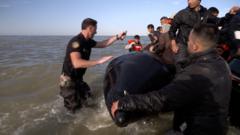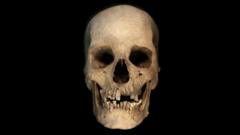As King Charles III welcomes French President Emmanuel Macron for a state visit, hopes are high for mending the historically strained relations between the UK and France. The diplomatic endeavors aim to address mutual concerns over defense, migration, and international cooperation against a backdrop of complex European dynamics.
Revitalizing Anglo-French Relations: King Charles III's Diplomatic Role

Revitalizing Anglo-French Relations: King Charles III's Diplomatic Role
King Charles III's strategic engagement during Emmanuel Macron's state visit marks a pivotal moment in rebuilding UK-France ties post-Brexit.
In a moment emblematic of British tradition and influence, King Charles III and Queen Camilla are set to greet Emmanuel and Brigitte Macron during a historic state visit, marking the first time a French president has traveled to the UK since 2008, and the first by an EU leader since Brexit. The event underscores a critical juncture in Franco-British relations during turbulent times in Europe. The visit, which includes formal ceremonies, a state banquet, and a UK-France summit co-chaired by Macron and UK Prime Minister Sir Keir Starmer, aims to cultivate goodwill and establish a cooperative framework on pressing issues including the return of irregular migrants and defense policies involving Ukraine.
Recent efforts to reset relations between the UK and EU have created a conducive atmosphere, particularly with regards to enhancing longstanding defense agreements. The two nations share vital strategic interests, being nuclear powers and permanent members of the UN Security Council, seeking to modernize the Lancaster House treaties that help define their combined military efforts. Personal rapport between leaders has been pivotal to this warming of ties, as suggested by former French ambassador Sylvie Bermann, who emphasized the enduring significance of this partnership.
King Charles III, a seasoned diplomat even before taking the throne, plays an active role in bridging gaps between the UK and France. Known for his fluency in French and deep appreciation of French culture, the King has engaged with various international leaders, notably welcoming Ukraine's President Volodymyr Zelensky to the UK amidst ongoing tensions. His connection to France, highlighted during Queen Elizabeth II's era, is further reflected in public receptions that have fostered goodwill.
However, the backdrop of strained relations post-Brexit casts a complex shadow over the visit. Discontent arose during Brexit negotiations, and previous confrontations, such as the fallout from Australia's submarine contract switch, strained trust further. The establishment of the European Political Community and recent Franco-British summits hint at renewed dialogue, but concerns about migration policy persist. These discussions will center not only on military collaborations but also on pragmatic approaches to managing migration that affect both nations.
The outcomes of the state visit and subsequent agreements on migration could lay the groundwork for renewed cooperation, offering a framework that might inspire broader European solutions to similar challenges. A collaborative approach is crucial, especially as the two nations explore possibilities of a "one-in, one-out" policy for asylum seekers, drawing attention to the pressing complexities surrounding migration issues.
While the specter of historical tensions lingers, the commitment by both nations to work on defense, migration, and broader political alignment signifies a desire to move forward. The success of King Charles III's diplomatic efforts during this state visit could shape not only the relationship between the UK and France but also influence the broader European landscape as it adapts to modern challenges. As the monarch reiterated in the past, the focus remains on building a modern partnership fit for the complexities of the 21st century.






















